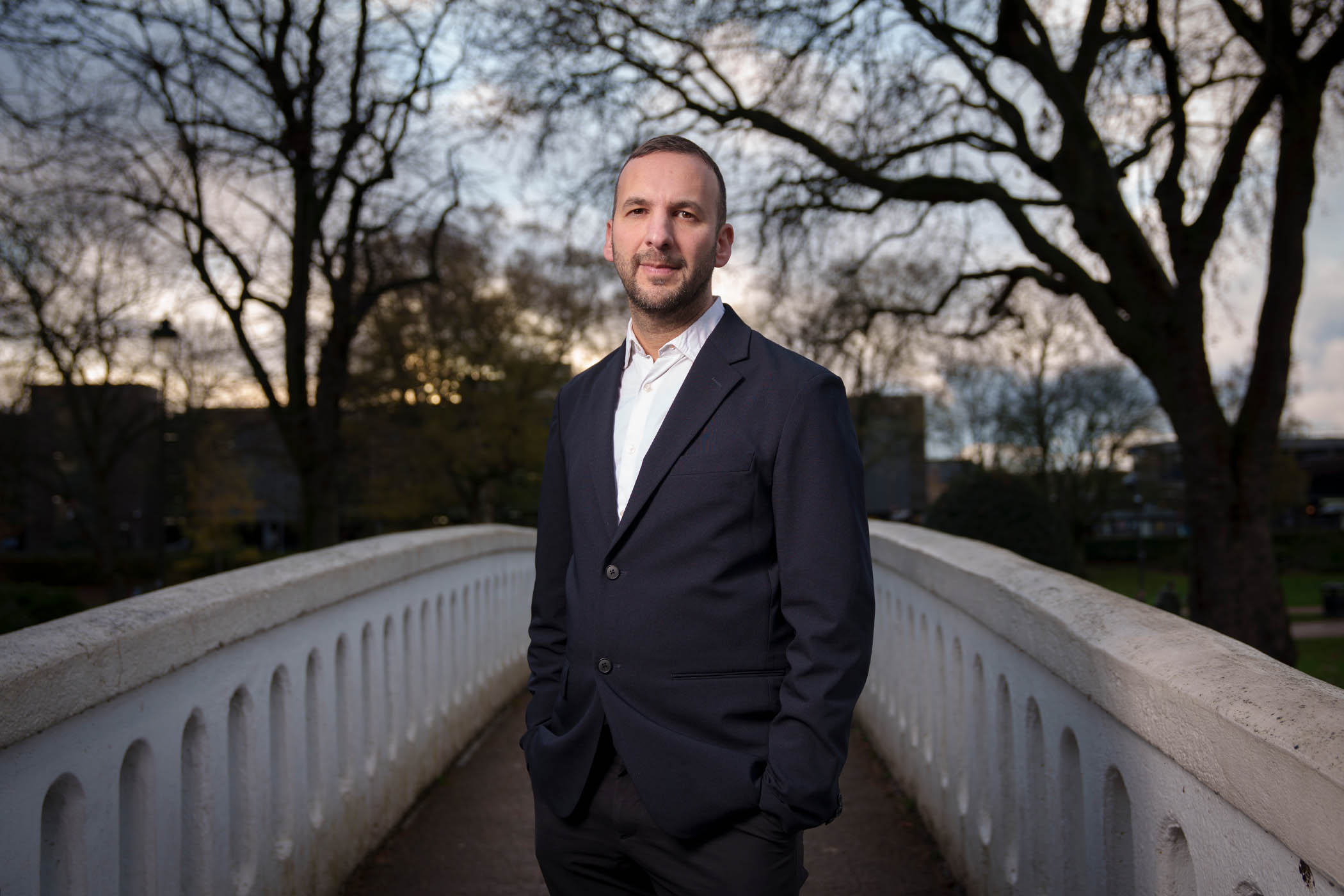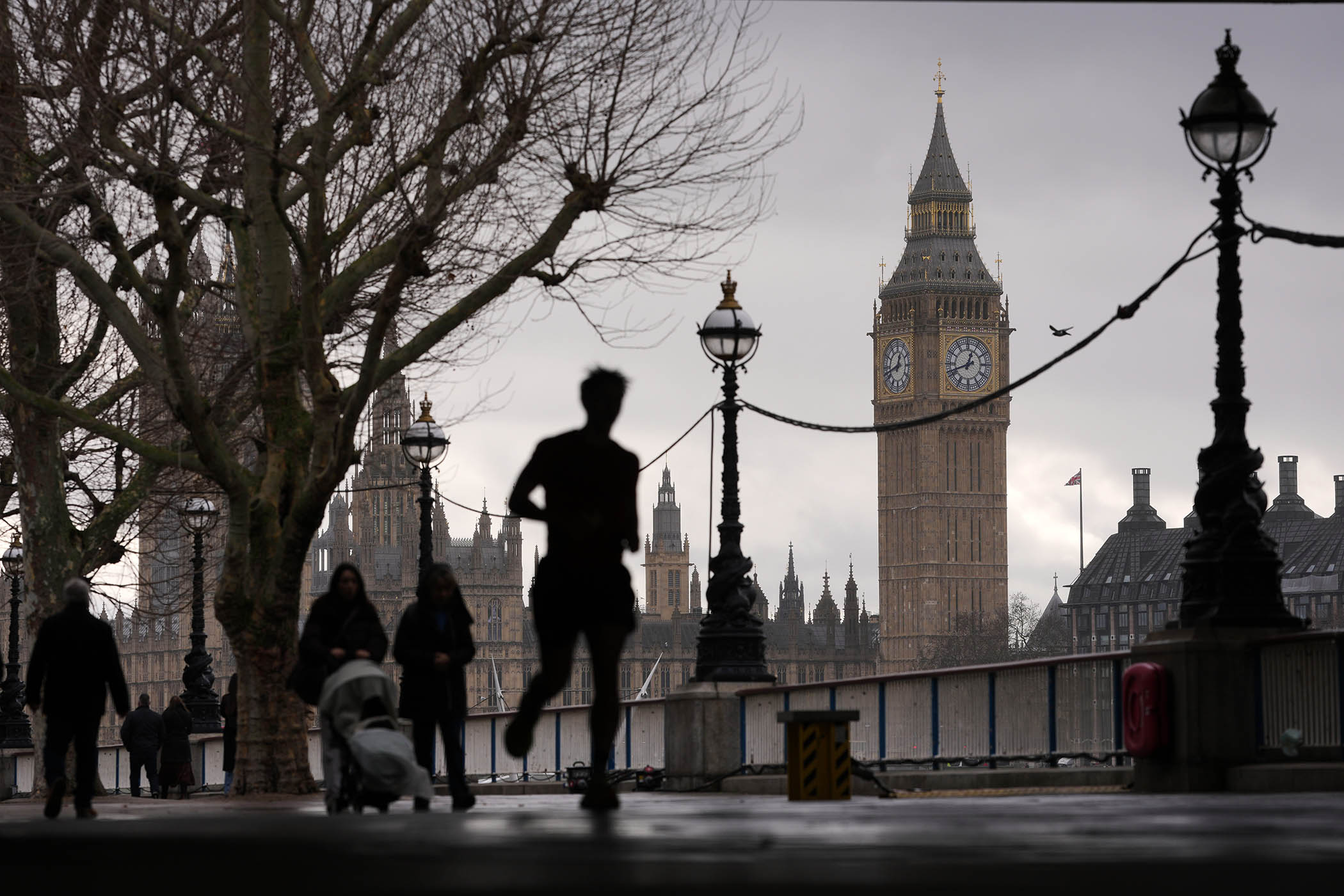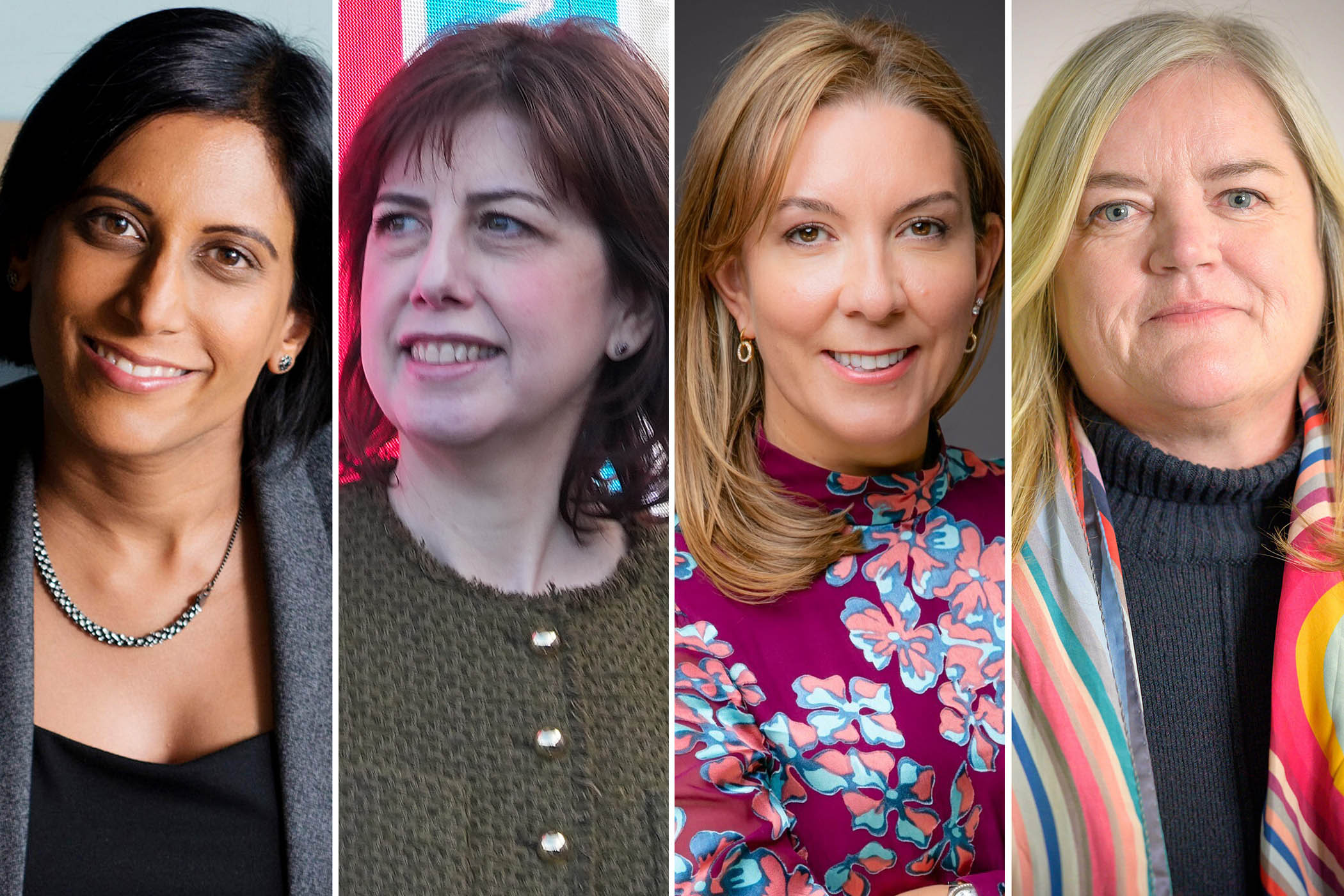Photograph by Andrew Fox
Zack Polanski is a former hypnotherapist and actor who is gay, Jewish and vegan, with crooked teeth. He is wearing secondhand clothes – an old Uniqlo suit that he bought on Vinted – and turquoise fake leather Dr Martens. He has not flown for more than a decade and he does not drive. His guilty pleasure is vegan jaffa cakes: “Yes, they do exist and they’re bloody gorgeous,” he says.
At the age of 43, the Green party leader in England and Wales is the opposite of a conventional politician but, with his promise to “make hope normal again”, he is taking Westminster by storm. Since he was elected in September, the Greens have leapfrogged over the Liberal Democrats and are tied in third place with the Conservatives in the polls.
Last week YouGov put them on 17%, just 2 percentage points behind Labour. Among young people, they are the most popular party. As progressive voters turn away from Keir Starmer’s government, the Greens now have 170,000 members – more than both the Tories and the Lib Dems. Polanski’s Instagram account has had at least 33m views in the past 30 days.
Some in Labour mutter that it is all a “Cleggmania”-style bubble – a reference to the once-popular former Lib Dem leader Nick Clegg – but Polanski hopes that his brand of leftwing eco-populism will be a match for Nigel Farage and Reform UK. Certainly, Polanski is a good communicator. Some have compared him to Zohran Mamdani, the recently elected Democratic mayor of New York. Already Polanski is accelerating the fragmentation of the traditional party system. So is he serious? And will his efforts to reshape politics for a new age be tarnished by association with the old hard left?
‘I love my smile, being gay and being Jewish, so people will really need to find some other way to hurt me’
‘I love my smile, being gay and being Jewish, so people will really need to find some other way to hurt me’
Zack Polanski
The walk Polanski has chosen goes from the cafe in Springfield Park in Clapton, Hackney, near his east London home, to Abney Park cemetery in Stoke Newington. When we meet, it has just stopped snowing but the air is still bitterly cold, so we order tea to warm up (earl grey with oat milk for him, PG Tips with semi-skimmed for me).
The Green leader is not even an MP – he is a member of the London assembly – but for anyone interested in politics, he is impossible to ignore or to miss. A proponent of what he calls “substance with clickbait”, he posts lots of short films on social media of himself talking to voters in Farage’s Clacton constituency, or standing on Dover Beach defending immigration.
There is one of him quoting Benjamin Zephaniah with his arms outstretched. “Nigel Farage has got more followers on TikTok than all the other MPs combined,” he says. “The video content is what’s connecting with people.”
Last week, his team met Mamdani’s videographer in London. Polanski was invited to New York to see the new mayor but he refused to take a plane to get there. “In the UK, people are understandably cynical about a slick video that has lots of money put into it. The good thing, though, is you don’t need a lot of money to be charming. You don’t need a lot of money to connect or to be authentic.”
You can agree or disagree with him, but Polanski does not pretend to be something he is not. As we wrap up in coats, gloves and hats and head off across the park, he is unusually willing for a politician to give a straight answer to questions. Does he want to rejoin the EU? “Yes”. Would he abolish the monarchy? “It’s not a priority, but I am a republican.”
Newsletters
Choose the newsletters you want to receive
View more
For information about how The Observer protects your data, read our Privacy Policy
Nor does he mince his words on immigration. Home secretary Shabana Mahmood’s proposals to make asylum status temporary were “disgusting, extreme, inhumane and morally despicable”, he says. “Migration is really important for this country. People are worried about the lack of council homes, the difficulty of getting NHS appointments and the sense that the country is broken. They’re right to feel all of those things but those are not the problems of migrants – they are the problems of multimillionaires and billionaires, and politicians who have refused to tax them and invest in their community.”
For years the Greens have championed renewable energy, recycling and the transition to net zero to tackle the climate crisis. Now the most pressing concern is inequality, Polanski says. “We want a 1% tax on assets of £10m or more and 2% on £1bn or more.” He claims that the annual levy would raise £14bn a year.
He thinks the billionaires who are “hoarding” their almost unfathomable wealth “would not even notice” a few million being snaffled by the taxman. “I’m talking about people who are making more money in their sleep than most of us can earn in a lifetime,” he says. “If you went back a million minutes, you would be back to January 2024. If you go back a billion minutes, you are in the Roman empire. That’s the difference between a million and a billion.”
How is he going to work out how much all the yachts, mansions, paintings and wine cellars are worth? “We need to spend more money on HM Revenue and Customs so we can have a proper valuation of assets.” The risk is that the super-rich will flee the country to avoid paying the tax but Polanski doubts it will happen. “The idea that people wouldn’t want to live here because we’re going to charge them 1% on their assets really downplays us as a country. If people are that unpatriotic, then it’s fine for them to leave.”
We reach the other side of the park and look out across the tower blocks towards Walthamstow and the River Lea. I wonder whether the shift of emphasis towards redistribution is driven partly by the sense that saving the planet may feel like a luxury to voters who are struggling to pay the bills.
“Social justice is environmental justice,” Polanski says. “At the moment, people care about the food on the table and heating their homes. That doesn’t mean they don't care about the climate crisis too but I think they want to know that the fossil fuel companies and the wealthy corporations are the ones who will pay for the transition.”
Instead of increasing taxes on airlines across the board, he is looking at a “frequent flyer levy” that would mean “if you’re going on holiday once a year, it is actually cheaper than it is right now”. He supports a universal basic income “so everyone in the country gets an unconditional amount that pays for things like their rent, their food, to make sure that they have enough money to survive”.
And, like Mamdani in New York, he backs free childcare and rent controls. “Renters are paying absolutely ridiculous amounts and we really need to control that.” It would all be eye-wateringly expensive but Polanski insists that everything could be funded through a “fairer taxation system”.
We walk on across the park, with the wind whipping against our faces. Polanski says he would “do anything” to stop a Reform government but would find it difficult to encourage people to vote tactically for Labour. “This is a party that has been complicit in a genocide in Gaza, that has targeted disabled people and migrants,” he says. “I don’t consider the Labour party to be part of the left at this point.”
He already knows what conditions he would set for working with another party in a coalition: a wealth tax, action on the climate crisis and proportional representation. But he rules out doing a deal with the prime minister. There is “absolutely no way I would touch Keir Starmer with a barge pole”, Polanski says. “He’s proven to be completely untrustworthy, incompetent and I think the public can't stand him, so I can’t see any scenario where I’d want to work with him.”
Polanski’s politics sound more similar to those of Jeremy Corbyn and Zarah Sultana, who in summer co-founded the leftwing Your Party. Would he welcome the former Labour politicians into his party if theirs implodes? “I like both Jeremy and Zarah, both politically and personally,” he replies. “Anyone who aligns with the values of the party, I would be happy to [see] join.” Last week, the former Labour MP Lloyd Russell-Moyle was accepted into the Greens. The direction of travel is clear but an influx of hardliners also poses risks for Polanski, who will lose support if he looks too extreme.
Sultana recently described Nato as an “imperialist war machine” and demanded that the UK should immediately withdraw from the transatlantic alliance. Polanski agrees. “We should be more willing to stand on our own two feet and build relationships with our neighbours, rather than outsourcing our national security to the United States,” he says. “We need to create an alternative alliance based on peace and diplomacy.”
What did he think about Corbyn’s suggestion that the allegations of antisemitism in the Labour party were exaggerated? “There have only been five Jewish people in leadership positions in British politics. And I'm No 5, so antisemitism is an issue that I take really seriously both politically and personally because it affects me.”
We leave the park and walk down Oldhill Street, home to a long-established Orthodox Jewish community. Men with long dark coats, side curls and wide-brimmed hats walk past. Polanski said his faith was “made to be important” to him when he was child. “I grew up in a Jewish school and wore a yarmulke [skullcap] every day and had a barmitzvah. It was a very traditional Jewish background.”
Born David Paulden in Salford, Greater Manchester, Polanski changed his surname at 18 to the original family name. He grew up thinking that his grandparents had anglicised it to avoid persecution by the Nazis. “When I was about 16 or 17, I found that the actual story was that they had changed it to evade antisemitism in the UK. There was a real sense at that time of families having to hide in the shadows.” His decision to change his first name to Zack – after the Jewish evacuee in the children’s book Goodnight Mister Tom – was “more complicated”. He had a difficult relationship with his stepfather, who was also called David. “I didn’t want to be a shadow of a man I didn’t particularly agree with.” He was 11 when his parents divorced. “It was devastating,” he says. “I remember long commutes between a mother living in north Manchester and a father living in south Manchester. I remember a lot of logistical difficulties and a lot of pain and hurt that my parents weren't together any more and couldn't love each other any more.”
His life at school was miserable. “In my teenage years, I was bullied both for being gay and Jewish. It was exactly what happens to far too many kids in this country, which is being isolated, picked on – verbal bullying and physical bullying.”
He told his friends he was gay when he was “14 or 15”, although he did not come out to his parents until much later. “At school, the bullying got to a point where I thought: ‘Well, if everyone thinks this about me, I might as well just own it,’” he says. “I think sometimes the best thing you can do is just be absolutely unashamed, authentically who you are, be really clear and bold about that and find joy in it. People will either like it or they won’t but at least you’re being honest.”
Polanski says he now experiences “both antisemitism and homophobia” on a daily basis – as well as insults about his teeth. “I brush it off and see it as people who are unhappy with their lives being hateful,” he says. “I love my smile and I love being gay and I love being Jewish, so they really need to find some other thing to try and hurt me with.”
We have reached Stoke Newington High Street. The woodland of Abney Park cemetery across the road is a haven of peace and tranquillity amid the traffic. This is where Polanski comes to clear his head. “When I was first thinking about running for leader of the Green party, I took many walks around the cemetery. It has a quietness and stillness.”
His partner Richie works as a physiotherapist in a hospice so he is never far from death. “Among many things he brings to my life is a reminder that, even when things are pretty bleak politically, all our times on Earth are short and we should enjoy every moment while doing the best we can,” Polanski says.
He is not afraid to dream. Does he think Britain is ready for a gay prime minister? “I would hope so. I think it would be pretty dire if someone's sexuality was something that affected anyone getting any job.”



